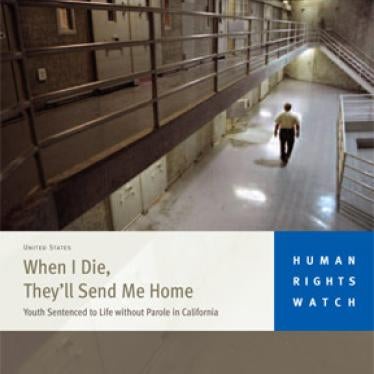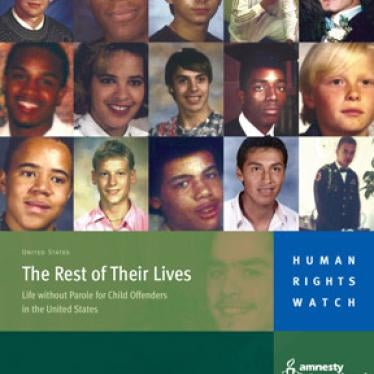(Los Angeles) - The California State Assembly should enact a pending bill for review of life sentences without parole for juvenile offenders following today's US Supreme Court decision, Human Rights Watch said.
In a landmark decision, the US Supreme Court in Graham v. Florida ruled that sentences of life without parole for juveniles who did not commit homicide are unconstitutional. The case reaffirmed a high court decision that youth are less culpable than adults, and thus less deserving of the most serious forms of punishment. The court also noted that life without parole is an especially harsh punishment for a juvenile, and that there was a "global consensus" against such sentences.
"The Supreme Court decision highlights the need for the California state legislature to take action," said Elizabeth Calvin, senior children's rights advocate at Human Rights Watch. "Without leadership from Sacramento, California will continue to throw away the lives of young people."
Of the over 2,500 juvenile life-without-parole cases in the US, approximately 129 involve juveniles who did not commit murder. The Supreme Court decision leaves the fate of the remaining juvenile life-without-parole cases in the hands of state lawmakers. In California, only four of the approximately 265 such cases did not involve homicide, Human Rights Watch said. Without state action, the other approximately 261 individuals serving these sentences will remain in prison until death.
The bill before the assembly, the Fair Sentencing for Youth Act (Senate Bill 399), passed the California Senate in June 2009. It would provide the possibility of parole for juvenile offenders in some cases after 25 years in prison.
Groups as diverse as the California Correctional Peace Officers Association, the California Psychiatric Association, and the California Catholic Conference of Bishops support the bill.
"In this time of fiscal crisis, a $40,000 or $50,000-a-year prison bed is a precious resource," Heidi Rummel, former prosecutor and professor of criminal law at the University of Southern California's Gould School of Law, told Human Rights Watch. "This bill requires California to stop wasting money imprisoning youth offenders who have become rehabilitated adults."
Family members of some crime victims also support the bill. Aqeela Sherrills' eldest son, Terrel, was 19-years-old and in college when he was shot and killed by a 17-year-old gang member. Sherrills believes that even his son's killer deserves a chance to change, and opposes the sentence of life without parole for teenagers.
"It's crucial we give children a second chance and the opportunity to change," he told Human Rights Watch.
"The sentence of life without parole is a sentence to die in prison," Javier Stauring, co-director of the Office of Restorative Justice of the Los Angeles Catholic Archdiocese, told Human Rights Watch. "Many of these young people would grab the opportunity to work toward rehabilitation and prove that the terrible mistakes they have made do not define who they become."
Other states have similar legislation pending, including Florida, Louisiana, Maryland, Michigan, and Nebraska.
Human Rights Watch investigated California's use of life sentences without parole for persons who were under age 18 at the time the crime was committed and published its findings in the 2008 report, "When I Die, They'll Send Me Home."
California's use of this sentence for youth is among the most unjust in the nation, the report concluded. An estimated 45 percent of those serving such sentences in California for murder cases were not the killers. Many were convicted of felony murder, or for aiding and abetting the murder, for instance, because they acted as lookouts or were participating in a robbery when a murder took place.
In nearly 70 percent of the California cases examined by Human Rights Watch in which the youth was not acting alone, at least one codefendant was an adult. Survey responses reveal that in 56 percent of those cases, the adult received a less severe sentence than the juvenile.
Human Rights Watch found that, nationally, an estimated 59 percent of those sentenced to life without parole for crimes committed as juveniles were first-time offenders.
International human rights law prohibits sentences of life without parole for those who commit a crime when under age 18, a prohibition that is universally applied outside of the United States. At present, 2,574 persons are serving such sentences in the United States. To Human Rights Watch's knowledge, not a single person is serving such a sentence anywhere else in the world.
"The United States is the world's worst human rights violator in terms of sentencing young offenders to life without parole," Calvin said.







